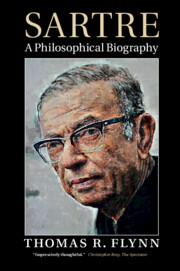Book contents
- Frontmatter
- Dedication
- Contents
- Preface
- Acknowledgments
- Abbreviations
- 1 The childhood of a genius
- 2 An elite education: student, author, soldier, teacher
- 3 Teaching in the lycée, 1931–1939
- 4 First triumph: The Imagination
- 5 Consciousness as imagination
- 6 The necessity of contingency: Nausea
- 7 The war years, 1939–1944
- 8 Bad faith in human life: Being and Nothingness
- 9 Existentialism: the fruit of liberation
- 10 Ends and means: existential ethics
- 11 Means and ends: political existentialism
- 12 A theory of history: Search for a Method
- 13 Individuals and groups: Critique of Dialectical Reason
- 14 A second ethics?
- 15 Existential biography: Flaubert and others
- Conclusion: the Sartrean imaginary, chastened but indomitable
- Select bibliography
- Index
- References
2 - An elite education: student, author, soldier, teacher
Published online by Cambridge University Press: 18 December 2014
- Frontmatter
- Dedication
- Contents
- Preface
- Acknowledgments
- Abbreviations
- 1 The childhood of a genius
- 2 An elite education: student, author, soldier, teacher
- 3 Teaching in the lycée, 1931–1939
- 4 First triumph: The Imagination
- 5 Consciousness as imagination
- 6 The necessity of contingency: Nausea
- 7 The war years, 1939–1944
- 8 Bad faith in human life: Being and Nothingness
- 9 Existentialism: the fruit of liberation
- 10 Ends and means: existential ethics
- 11 Means and ends: political existentialism
- 12 A theory of history: Search for a Method
- 13 Individuals and groups: Critique of Dialectical Reason
- 14 A second ethics?
- 15 Existential biography: Flaubert and others
- Conclusion: the Sartrean imaginary, chastened but indomitable
- Select bibliography
- Index
- References
Summary
After a mixed performance in the public school in La Rochelle, Sartre returned to Paris and the Lycée Henri IV in October of 1920, this time as a boarder, where he rejoined Paul Nizan. Already a voracious reader, and nudged by his friend Nizan, who also nourished literary aspirations, Sartre discovered authors such as Giraudoux, Gide, Paul Morand, Valéry and especially Proust, who would continue to interest and form him in the coming years. He discussed Dostoevsky with his grandmother on home visits and perhaps with her began his reading of Stendhal, who would become his favorite author.
Faced with much stiffer competition, his academic performance grew apace. The following year Sartre received the prize for excellence on the first half of the baccalaureate exams, June 1921, and completed the second half in June1922. While still studying for their baccalaureates, both Sartre and Nizan attended the post-baccalaureate lectures of the renowned, charismatic professor Emile Chartier, known as Alain, whose pacifism impressed both young men. Sartre would occasionally quote Alain in later years, probably more than any of his other teachers, though not always positively. But when the time came to undertake the two-year preparation for the admission exam to the École Normale Supérieure, called hypokhâgne and khâgne respectively, Sartre’s family saw to it that he transferred to the reputedly more rigorous Lycée Louis-le-Grand. Paul Nizan transferred there as well. They entered in the fall of 1922, Sartre as a day student, living with his mother and stepfather, who had returned to Paris.
- Type
- Chapter
- Information
- SartreA Philosophical Biography, pp. 20 - 46Publisher: Cambridge University PressPrint publication year: 2014



